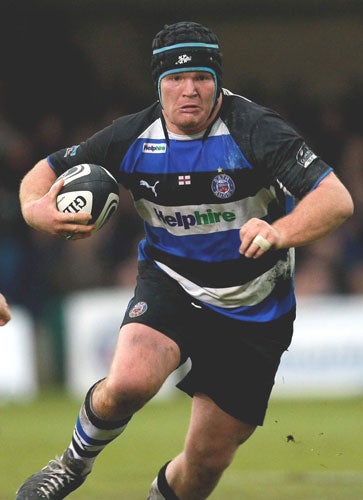Stevens is banned for two years
Suspension leaves prop's club and international future prospects in serious doubt

Matt Stevens, the England tight-head prop who tested positive for cocaine after playing a Heineken Cup match for Bath against Glasgow in mid-December, was last night banned from all rugby – and, indeed, all rugby-related activities – for two years. He will not be permitted to train in any rugby environment, let alone play a game, and there is now a serious doubt over his future in the sport. Certainly, a place in the red-rose squad for the 2011 World Cup looks way out of reach.
It is far from certain that Andrew Brownsword, the Bath chairman and principal investor, will countenance Stevens returning to the club when his suspension expires on 18 January 2011. "We will be holding an internal meeting with Matt before making any further statement on this matter," a spokesman said.
If the 26-year-old naturalised South African was hoping for some succour from the England hierarchy, he hoped in vain. "I have said all through this episode that there is no place in sport, or society, for illegal drug use," Martin Johnson, the national manager, said. "Matt chose to take a banned substance and will now have to accept the consequences. He will not be involved in rugby for two years, and for a professional sportsman that will be a very tough experience. He has admitted he has a problem and is seeking help. We support him in that, but all rugby players must understand that they are responsible for their actions, and that includes lifestyle choices."
Stevens made his admission on television after receiving confirmation of his positive sample. It meant that yesterday's formal business, conducted in Glasgow before a European Rugby Cup disciplinary tribunal, was brief and to the point. In a statement, the panel said cocaine was considered to be a stimulant and was therefore a prohibited substance under Heineken Cup, International Rugby Board and World Anti-Doping Agency codes.
Unfortunately for Twickenham, it was a difficult day all round. Not for the first time in recent seasons, the IRB mounted a public defence of England's least favourite referee, the South African official Jonathan Kaplan, in response to a sharp volley of criticism from the red-rose management. The board rejected views expressed by the England attack coach Brian Smith, who effectively accused Kaplan of yielding to Welsh "pressure" during the Six Nations game in Cardiff almost a fortnight ago and allowing the home side the rub of the green. England, who lost two players to the sin bin, also lost the match.
Smith's comments were dismissed as unwarranted. "The official performance review ranks Kaplan's performance as high and we are satisfied that he followed the correct protocol for addressing both teams on and off the pitch, dealt with England and Wales in a fair and professional manner, and refereed what was in front of him," a spokesman said.
Meanwhile, a dozen of the Saracens players whose contracts will be terminated at the end of the season have been meeting with Professional Rugby Players' Association lawyers to discuss their options following Monday's cull.
Join our commenting forum
Join thought-provoking conversations, follow other Independent readers and see their replies
Comments
Bookmark popover
Removed from bookmarks